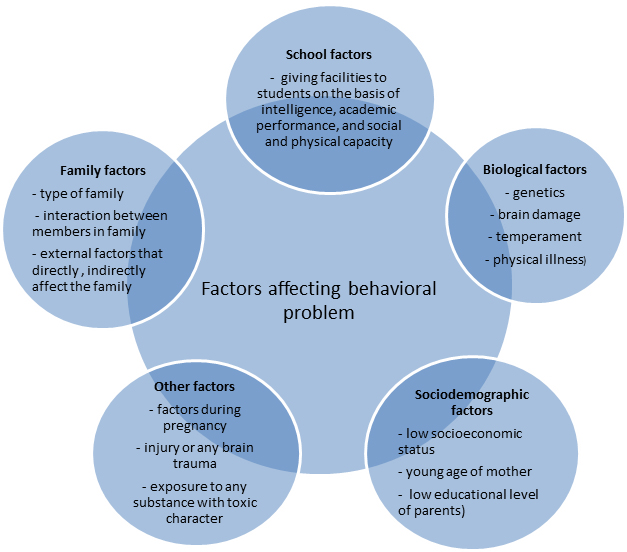Behaviour Problems

Internalizing Behavioural problems that are directed from internal like, anxiety, sadness, depression, complaining of somatic pains frequently, some specific phobias. Internalizing behavioural problems are common among girls.
Externalizing Behavioural problems that are directed from external and are expressed in actions like, being angry, violence, overactive, attention problems. These problems are common boys.
All children and young people are different and react to life in different ways. At some stages, particularly pre-school and teenage years, children can find it hard to control emotions. This is a normal part of their development as they learn to cope with life and realise they can’t have everything their own way.
Children also go through stages, as their brains develop and they try out different emotions and ways of reacting to the world. It’s normal for younger children to have fears (for example, of ghosts or monsters or dogs), as they become aware there are dangers in the wider world around them and they learn to distinguish between reality and fiction. Many children develop patterns of behaviour to comfort themselves if they feel anxious, such as thumb sucking or wanting to do the same things at the same time every day.
As they get towards puberty, children can become more defiant as they start to be independent and separate psychologically from parents and carers. And when the teen years begin, many young people become moody, angry or tearful and battles with parents can become a daily occurrence.

Personality plays a part too – some children are naturally more anxious than others, some express themselves physically or are very emotional while others are more reserved.
But if your child’s behaviour has changed recently, or you have started worrying about it and are not sure if what they are going through is normal or not, it’s worth thinking about the following:- Is the behaviour out of character for your child, or does it fit in with their general way of dealing with things?
- Has the change been very sudden or have things been changing for a while?
- Is there anything obvious that might have upset or unsettled them? For example, moving house or school, divorce and separation bereavement, friendship problems, illness
- Is the behaviour having a negative effect on their daily life, for example, stopping them attending school or getting their schoolwork done; affecting friendships or family relationships; getting in the way of hobbies or activities; affecting their eating or sleeping?
- Is anyone else worried about their behaviour? eg other family members, teachers, friends
- Has your child said they think there is a problem or that they are worried?
There are no right answers, but these questions might help you think about what has been going on and whether it is normal for your child.